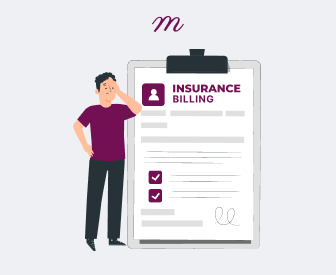Have your progress notes written for you automatically
Feeling overwhelmed by insurance billing in your therapy private practice? You are not alone. Billing insurance companies sometimes leave even the most seasoned mental health therapists feeling frustrated. This is due to navigating the entire billing process. It includes insurance claims, denials, coding, and endless paperwork.
Ineffective insurance billing can lead to loss of revenue and hinder the growth of your practice. You need to understand how to bill insurance in your private practice successfully. This comprehensive guide will equip you with the knowledge required to streamline your billing process. It will enable you to maximize reimbursements and have a smooth cash flow while delivering top-notch care to your clients.
What You Need To Know Before Billing Insurance in Private Practice
Billing insurance is not as complicated as it may seem. The first thing you need to get is your National Provider Identifier (NPI). You can use this unique identification number within the healthcare system. The National Plan and Provider Enumeration System (NPPES) has made it available for you to get for free.
The second thing you need as a mental health therapist is to identify the specific Taxonomy. This shows your area of expertise. You’ll find this code information on the NPPES website. The code is essential when deciding if you will be a Medicare or Medicaid healthcare provider.
Next, you’ll need to prepare your credentials before billing insurance. This step is vital when you intend to accept insurance. Each insurance company has its credentialing process. You need to find out the specific requirements of your insurer. Also, verify that you’re an in-network provider with them.
It is best to invest in management software that is designed for private practice. When billing insurance private practice, these software will help to reduce your workload. Some of these software can help you with appointment scheduling. They also help with billing and claims submission. With these software tools, you can focus on creating a positive client experience. You will also have a smoother workflow while getting prompt payments.
The Step-by-Step Insurance Billing Process
As a mental health therapist, focusing on quality patient care is only part of the things you have to handle. There are other administrative tasks involved in your private practice which affect payment for your services. They include billing insurance and filing insurance claims. This insurance billing basics will provide all you need to know from client intake to reimbursement.
Client Intake
For your initial client intake session, you need to put together your client's insurance information. You’ll need to be careful in obtaining all the necessary client information. The information you need includes your client’s insurance company name. It also includes the policy number and member ID. After getting these details, you need to verify it with the insurance company. Ensure you confirm the full coverage for your services.
This proactive step can save you time and frustration down the road. The financial responsibility must be clear to your clients as you work with insurance providers. You need to state the financial responsibility assigned to your client on your client intake form. This is important whether it's self-pay or accepting insurance in private practice. In the case of a bounced check, you also need to communicate with your client to avoid financial loss.
Documenting the Session
Ensure you verify that your client’s insurance company covers your treatment plans. Then, you can proceed with the therapy session. After each session with your client, document the services you provide. This documentation should include the specific CPT code used. Also, add the relevant ICD-10 code for your client's diagnosis. Ensure your notes are clear and concise. The notes should reflect the things addressed during the session. Detailed and accurate documentation determines the smooth processing of your claims. Using the wrong codes can lead to denied claims and delayed payments.
Filing the Claim
There are two primary methods for submitting claims to insurance companies. The first way is electronically through your practice management software. The second method is by mail using a standard CMS-1500 form that you can manually fill out.
Following Up
It is important to note that your claims can be denied for various reasons. This can be due to using incorrect coding. It can also be a result of missing information during the billing process. Be prepared to follow up with the insurance company to understand the reason for the denial. Once you have a clear understanding of the issue, you can resubmit the claim with the corrected information. Although, when working with insurance companies, you will need to be persistent. This is because they are a key factor in maximizing your reimbursement success rate.
The following strategies will help to optimize your workflow:
Standardize Your Documentation
Developing templates for your session notes can seem quite daunting. It becomes arduous especially when you have a large caseload. These templates include the date, client name, service code, and diagnosis code. It also shows a clear description of the services you render.
For therapists in private practice, you can consider software programs like Mentalyc. This program provides ready-made templates to help you create standardized documentation. The software note-taking app is reliable, efficient and 100% HIPAA compliant. It will save you time, and boost your productivity. Consistency in your documentation is crucial. With Mentalyc, you can focus on quality patient care while you put in more billable hours of work.
Use Technology
Practice management software can be a game-changer in making your billing process easier. Several software options offer features like automated claim generation and electronic submission. They increase efficiency and reduce the manual effort you put into the billing tasks. Other software tools like eligibility verification tools are also available. It can help you to confirm the insurance coverage of your clients before you render your service. This further reduces the risk of claim denials.
Batch Processing
It can be quite challenging sorting out billings and claims when you have a large caseload. For ease, consider grouping similar claims together for submission. This can save you time compared to when you submit the claims individually. But, ensure you adhere to any timelines set by the insurance company.
Common Insurance Billing Mistakes in Private Practice
Insurance billing is a detail-oriented process. The minor mistakes you make can lead to claim denials and delays in reimbursement. Here are some of the common billing mistakes to avoid:
Inaccurate Coding
Selecting the wrong CPT or ICD-10 code is a frequent cause of claim denials. So, it's best to invest in getting your coding right. You can work on becoming a Certified Professional Coder (CPC). It will help to improve your coding accuracy. You can also consider outsourcing the coding to a professional.
Incomplete Information
The missing information on your claims is another reason for facing delays. Ensure you double-check all details, including your client information. Also check the service codes, diagnoses, and prior authorization numbers.
Untimely Filing
Most insurance companies have set timelines for claim submissions. If you miss their timelines, it can result in denials. It is better to create a system that ensures you submit the claims on time. Batch processing is also helpful. It will boost your efficiency so that you can avoid last-minute rushes.
Insufficient Documentation
Poorly documented therapy sessions lack the necessary details to justify your billing. As a mental health practitioner, you need to pay attention to capture all details. You can include other specific details about the client's condition. Highlight the type of interventions you use. Your treatment progress should be well documented.
Not Following Up on Denials
Don't accept denials passively. You need to understand the reason for denial so that you can determine if it requires follow-up. Sometimes, the reason is due to an error that you can correct. In this case, resubmit the claim with the necessary adjustments. Sometimes, you may need to appeal the denial if it is incorrect.
Outsourcing Options For Billing Insurance in Private Practice
You don’t have to handle all aspects of your insurance billing alone. As a mental health therapist in a private practice, you can outsource this billing task. Consider the following outsourcing options:
Hiring a Biller
When you hire a dedicated in-house biller, your entire insurance billing process is covered. Your in-house biller will verify all your insurance information. The biller will also handle the submission of claims and follow up on denials. This allows you to focus your time and energy on quality client care. Billers have extensive knowledge of insurance billing procedures. They can help you deal with complex billing situations.
Some companies specialize in medical billing. The professional billing service will cover the entire billing process on your behalf. This is a good option for mental health professionals who have larger practices. It is also best for those with complex billing needs.
These companies hire experienced billers and coders. They ensure accurate claim submissions and help to maximize your reimbursement opportunities. The decision of whether to outsource billing depends on your practice needs. Consider your workload, budget, and comfort level before making this decision.
Conclusion
Getting your insurance billing right is crucial for your practice’s growth. By using these strategies above, you can handle your billing tasks better. This will help to reduce denials and boost your revenue. It allows you to focus on what matters, which is providing exceptional care to your clients. You can decide whether to manage billing yourself or outsource your billing process. Your choice is based on what works best for you. Remember, a well-managed billing system is an ongoing effort that leads to your practice’s long-term success.
Frequently Asked Questions
Can I Use A Clearing House To Simplify My Billing Process?
Yes, using clearinghouse services is a smart way to simplify your insurance billing. A clearinghouse acts as a middleman between your practice and insurance companies. They send your claims electronically to the right insurance company. Clearinghouses can track your claims in real time and fix any issues that arise. They receive your claims and check them for mistakes. They help in formatting your claims correctly. This ensures that you have minimal errors and reduces the chances of rejection. This will save you time, effort and speed up your reimbursements. They help you maintain a steady cash flow.
Clearing houses process payments electronically. So, when you’re choosing a clearinghouse, ensure it works well with your software. They offer the services you need that fit your budget. Aside from providing good customer support, they also keep your client's data secure.
How Can I Successfully Train My Staff to Handle Insurance Billing?
You can train your staff for smooth insurance billing. Start by familiarizing them with essential medical billing codes like CPT and ICD-10. You can also consider offering basic coding workshops. If you are using practice management software for tasks, ensure your staff are comfortable using it. These software programs can be used for data entry, claim submission, and tracking claim status.
Additionally, put in place a standardized client check-in procedure. This will enable you to collect accurate insurance information and verify coverage. You’ll also be able to get all necessary authorizations to reduce billing delays.
How Can I Maximize My Reimbursement Rate in Private Practice?
You can maximize your reimbursement rates by keeping track of the insurance rates. Then, adjust your fees accordingly. To bill insurance in private practice as a mental health provider, use accurate codes. Also, get all prior required authorizations. Keeping up with the latest coding changes will help to avoid claim denials.










